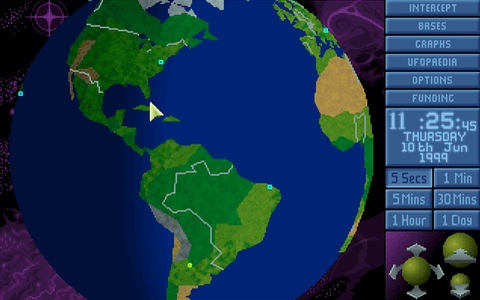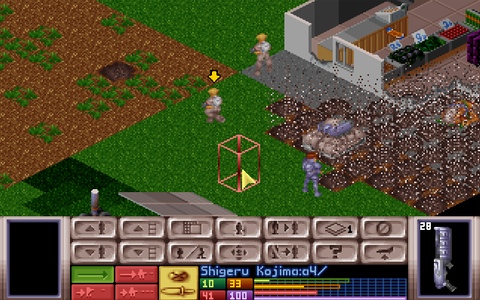Computer games tend to not have much of a lifespan, and when they do, I think a lot of it is due more to nostalgia than because they hold up especially well (not that modern games are a massive step forward, but there’s an evolutionary process, you know?). However, there are a few games that hold up particularly well, and still have active — albeit very nerdy and obsessive — communities. Cults of grubby retro-gamers, with ancient desktops running obsolete software to keep alive a few embers of games past. Nethack is probably the classic example, of course, and still the most brilliant game I have ever played. But only a couple of paces behind is a little PC game from 1993 called X-COM: UFO Defence, a game that took the #1 slot on IGN’s Top 25 PC Games of all time, and is still, 15 years after release, being dissected in The Escapist. Not to mention the numerous fan remakes and clone, and an extremely thorough wiki in which tactics and programming quirks are still being debated.
The premise is unofficially borrowed from the pretty cool 1970s British TV series UFO, with nods to The X-Files (the game itself is from the UK, where it was titled UFO: Enemy Unknown). Aliens are secretly invading earth, and it’s up to a shadowy, government-funded paramilitary organization — the eXtra-terrestrial COMbat Unit — to stop them. Gameplay starts in the once-futuristic year 1999, with X-COM operating out of a small base with a handful of soldiers, scientists and engineers. And then the aliens start sending out their first few scouts. As the game progresses, you can shoot down or capture alien ships and research their technology to build more powerful weapons and aircraft, and learn the aliens’ plans for Earth. At the same time, though, the aliens up the ante with more sophisticated missions, including infiltrating governments and terrorizing cities. As the campaign progresses, new species of aliens appear, which can blast you with exotic weapons or use their psi powers to make your troops panic or turn on each other.

Gameplay is divided between two different modes. In the Geoscape view, you manage the strategic aspects of your organization — building bases around the world, staffing them with scientists and engineers and tracking UFOs, first locally and soon internationally. Your big concerns here are balancing your resources to effectively battle the alien invasion: spend too much money on research and you won’t be able to build new bases to intercept UFOs; spend too much on conventional planes and weapons and you’ll be stuck on the wrong side of a steadily-increasing technology gap.
Eventually, though, you’re going to have to go toe-to-toe with the greys and their buddies, which brings you to the Tactical view, where you assemble and equip a squad and send them into the field. Typical missions involve assaulting an alien landing or crash site, defending a city being terrorized by aliens, or infiltrating an alien base. In every case, though, the goal is simple: kill the aliens before they kill you. Other factors come into play, such as limiting civilian casualties or trying to take aliens alive for research, but it comes down every time to a bug hunt.
Which is fine by me, since X-COM does it brilliantly. The action is turn-based — you move all your soldiers one by one, and then the aliens move. But there are plenty of elements to keep it interesting. For starters, you can only see what your soldiers see, making every grove of trees and farm house a potential trap — and during night missions, the aliens can see much better than your soldiers. Units with time left over can automatically fire during the alien’s turn, creating opportunities for snipers and ambushes. Given enough explosive power, you can destroy most objects in the terrain. This means you’re going to be lobbing rockets and explosives into buildings and behind trees you think might be hiding aliens — my urban terror missions, in particular, tend to end with several blocks of smouldering rubble. And if things get hairy (as they often do, deep in the bowels of an alien ship or base), your inexperienced units have a tendency to panic, throwing your elegant squad formations into disarray. Soldiers that survive get promoted and become more skilled and disciplined, but it’s not uncommon for a tough mission to take out over half my squad.

X-COM’s not a perfect game. (Only Nethack has ever truly achieved gaming perfection.) The alien AI isn’t very sophisticated — actually, it’s borderline retarded — and the game actually gets easier as it goes on, thanks to your ever-improving weapons, armour and aircraft. But flaws aside, it is pretty damn brilliant, and passes the “one more turn” test handily.
X-COM on the Mac
As a nerdy teen, I played this obsessively when it came out, but since then, I haven’t had much luck — even when I got it running on one of my 21st-century computers, it would be unstable, or the sound wouldn’t work. I’d play for an afternoon but eventually the repeated crashes would frustrate me and I’d give up for a year or two. This time, however — this time, the technology seems to finally exist for me to play a 15-year-old game… flawlessly. All hail technology! It wasn’t even very hard. And so, in the interest of spreading the addiction, here’s what I did.
- Acquire a copy of X-COM. I had a copy already, but you might be able to get one on eBay. Or, you know, elsewhere. Make sure you get the MS-DOS version, unless you feel like getting a 15-year-old copy of Windows running on your computer, too.
- Install DOSBox. It’s an x86 emulator that will run MS-DOS on the Mac.
- Install the DOSBox X-COM configuration files generously posted here. It was a little slow on my MacBook, so I ended up editing it, increasing the cycles to 12000 and using the output=overlay full-screen mode.
- You might also want to install XcomUtil, an elaborate “game enhancer”, which allows you to optionally change any or all of a list of game aspects. Most of these are fixes for some of the more annoying elements — like having to re-assign gear to the same soldiers every mission, or the fact that about 60% of missions take place on the farmland terrain. I must have destroyed that same damn stable a hundred times…
- Play! The manual is here. You might want to check out the UFOpaedia for tips, but the game is actually pretty forgiving at the easier difficulty levels. As long as you keep building and buying things sensibly and intercepting all the UFOs you can, you won’t go too far off.
- The second time through, you might want a bit of a challenge. The XcomUtil patch can add some challenges, particularly making research less easy by forcing you to capture live aliens to decipher their technology. I’ve also been trying to play the game without using any alien plasma weapons, which makes terror missions and base assaults particularly tense, as they should be.
Oh, and lastly, I know that in writing this long, gushing blog post about an old PC game will forever cement my reputation as a huge geek. I think I’m at the age where… I’m okay with that. Go X-COM!! Wooo!
 I decided to suspend my
I decided to suspend my 
 I couldn’t persuade any of my friends to come out to see My Winnipeg at the Tinseltown on a Wednesday night, so I saw by myself, in a theatre occupied by just me and a couple few rows behind me. It’s okay, though — if ever there was a movie meant to wash over you alone in the dark of an empty theatre, it’s this one. I don’t know if it’s the kind of movie I would go around recommending to people, but I’m pretty damn glad I saw it.
I couldn’t persuade any of my friends to come out to see My Winnipeg at the Tinseltown on a Wednesday night, so I saw by myself, in a theatre occupied by just me and a couple few rows behind me. It’s okay, though — if ever there was a movie meant to wash over you alone in the dark of an empty theatre, it’s this one. I don’t know if it’s the kind of movie I would go around recommending to people, but I’m pretty damn glad I saw it.